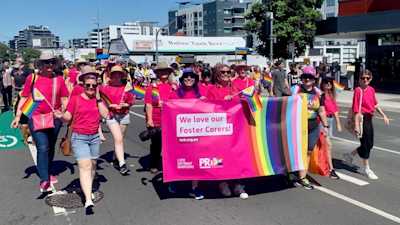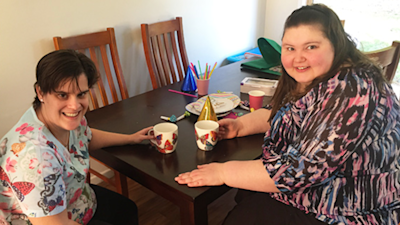Advancing equality and extending opportunity across the country.

Image: A young woman with long hair and white glasses in looking at a book. 'Budget Recap' is written in white.
Life Without Barriers welcomes measures in the 2023-24 Federal Budget. We are focused on key areas of social investment for people in vulnerable communities whilst acknowledging more work is needed to create greater equity in access to basic needs, employment and housing. If you missed out on the live Budget updates, we have recapped some of the key facts and figures.
Disability – NDIS
Major elements of the NDIS came in pre-budget announcements, however, the Budget has offered further detail on the specific investment in NDIS reform.
Six key areas of systemic reform were outlined to secure the scheme’s sustainability for the future including agency reform, addressing costs via the growth cap, introducing long-term plans, reviewing SIL arrangements and targeting fraud and misuse. Federal budget funding to achieve the reforms includes:
$910 million over four years including $732.9 million to improve effectiveness and uplift capability, capacity and systems to better support participants
$429.5 million investment in the NDIA’s workforce capability and systems
$140 million on plan flexibility and transparency and support for participants to manage plans within budget, including oversight by NDIA to drive provider and support coordinator accountability
$56.4 million to strengthen supported independent living decisions, including a home and living panel to improve consistency across decisions
$142.6 million to support the NDIS Quality and Safeguards Commission
$24.6 million to trial a blended payment between participants and providers to increase incentives for providers to innovate service delivery and improve outcomes
$7.3 million to reduce the number of people under the age of 65 living in residential aged care
$14.1 million towards a COVID-19 Leave Grant to support disability workers
Chief Executive of Life Without Barriers, Claire Robbs said that Life Without Barriers is enthusiastic about reforms to the NDIS and the government’s approach to bring the scheme’s focus back to those it was designed to support.
“The people we support have told us they want great services from providers they know are going to be around for the long term."
"That means Australia needs an NDIS that not only supports people with disability to live their best lives but also ensures that the funding, workforce and scheme that backs that support is sustainable in the long-term,” Ms Robbs said.

Investing in Aboriginal and Torres Strait Islander Communities:
Implementing the Uluru Statement: Committing to the full implementation of the Uluru Statement from the Heart, including a referendum on creating an Aboriginal and Torres Strait Islander Voice to Parliament
Investing in Central Australia: Providing $250 million for A Better, Safer Future for Central Australia, focusing on community safety, job creation, better services, education, and on-country learning
Closing the Gap: Investing $1.9 billion over 5 years to improve the lives and economic opportunities of Aboriginal and Torres Strait Islander people. Funding education, language preservation, economic participation, health, and housing and infrastructure projects
Ms Robbs also welcomed measures to address substantial gaps in the health and well-being of Aboriginal and Torres Strait Islander peoples.
“It is positive to see a substantial commitment in the budget focus on direct investment into Aboriginal and Torres Strait Islander Communities by delivering funding to drive progress on closing the gap measures.
"In particular, the impact of this budget’s investment in supporting high-quality culturally appropriate education for Aboriginal and Torres Strait Islander peoples in remote areas across Australia should not be underestimated."
However, the Budget failed to appoint funding for a National Commissioner for Aboriginal and Torres Strait Islander children which would have enabled a greater focus on supporting and protecting the rights of children over-represented in the out-of-home care system.
Failure to adequately address measures to restore access to early education for children at suitable levels to help close the gap on over-representation.
Whilst under state responsibility, peaks including SNAICC have voiced disappointment with the lack of federally backed budget support to address Target 12 on reducing the over-representation of children in care.
Advancing Gender Equality:
Closing the gender pay gap: Employers with 100 or more workers will be required to publish their gender pay gaps from early 2024
Supporting women's health: Investing in affordable and high-quality healthcare for women and girls. Making breast cancer testing more affordable
Ending violence against women and children: Commitment to the National Plan to End Violence Against Women and Children 2022-32, with additional funding of $589.3 million for women's safety. Investing in First Nations family safety initiatives
Better Support for Parents:
Expanding eligibility for Parenting Payment (Single): Primary carers, mostly women, will receive extended support until their youngest child turns 14
Abolishing ParentsNext: Replacing it with a voluntary program for high-quality pre-employment support
Strengthening Paid Parental Leave and affordable early childhood education and care: Changes to provide greater support and choice for parents, benefiting children and advancing gender equality
Fairer child support system: Making it easier for employers to withhold child support from a parent's wages
Addressing Entrenched Disadvantage in Communities:
Integrated package to achieve long-term positive change: Investing $199.8 million to address entrenched and concentrated community disadvantage
Delivering a Framework to Address Community Disadvantage: Working in partnership with communities, identifying strategic objectives and principles
Empowering community-led change backed by data: Extending the Stronger Places, Stronger People initiative and investing in data capability for improved outcomes
Establishing an Outcomes Fund: Allocating $100 million to make payments for programs delivering agreed, measurable outcomes
Supporting social enterprises and access to finance: Convening an Investor Roundtable and providing grants and education for social impact organisations
Partnering with philanthropy: Collaborating with leading philanthropies to improve outcomes for children and families
Aged Care
An increasing ageing population is set to continue to put pressure on the Budget, as aged care becomes the fifth-largest area of federal government expenditure. Substantial investment has been outlined including additional measures to implement recommendations from the Aged Care Royal Commission:
$11.3 billion for a historic wage increase for aged care workers from July
$166.8 million to provide an additional 9,500 home care packages
$52.1 million to increase the funding available to aged care providers in very remote areas and the appointment of a First Nations Aged Care Commissioner
$487 million to extend the Disability Support for Older Australian Program

Image: Emma Bennison, Chief Innovation Officer, wearing a light pink shirt and dark pants, stands next to a brick wall with a tree behind her. Photography: Jess Oakenfull, commissioned by the Tasmanian Department of Premier and Cabinet.
Emma Bennison, Manager, Strategic Engagement in Disability Employment at Life Without Barriers, said it’s positive to see a budget that provides support to people looking to get into the workforce.
“It’s encouraging to see this government working towards delivering the commitments made at the Jobs and Skills Summit. This Budget outlines specific personalised support and mentoring aimed at increasing the diversity of the apprentice workforce, including upskilling apprentices with disabilities,” Ms Bennison said.
“Strengthening the supports available to people with disabilities is a critical part of making real progress in the employment barriers for people with disability.”
Beyond the measures outlined in the Budget, Ms Bennison said there is action we can take now to disrupt long-standing barriers to employment and increase the representation of people with disability in influential roles across sectors.
“We want to see greater action across Government outside of the budget that shows opportunities being paved for people with disability in leadership positions – if we want to increase the genuine diversity and representation of our workforce and disrupt barriers to employment, we need Government to lead by example.”
Refugees and Asylum Seekers
There have been no reports of additional funding for Asylum Seekers in the 2023 Budget and no changes to the number of Humanitarian visas provided by the Government.
The cost to apply for any visa will rise by at least 6% which may make legitimate avenues to come to Australia more unaffordable for people in critical need.
$38.2 million to provide financial support for migrant women and women on temporary visas as they escape violence.
You can find more information about the 2023-24 Budget here.


